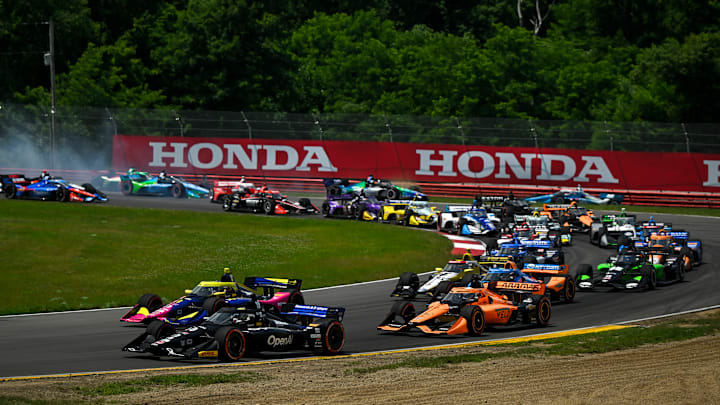Summer is usually the quietest part of the Formula 1 season, but when the British Grand Prix wrapped up last weekend, I took a look at what was coming up.
The Belgian Grand Prix, ah yes, so is it coming up next week or is there a week off in between? No? There is a three-week gap between these races?
It's true: the F1 calendar only features two grands prix from now until the final day of August.
F1's 2025 Summer Schedule
Date | Race? |
|---|---|
Sunday, July 13 | No Race |
Sunday, July 20 | No Race |
Sunday, July 27 | Belgian Grand Prix |
Sunday, August 3 | Hungarian Grand Prix |
Sunday, August 10 | Summer Break |
Sunday, August 17 | Summer Break |
Sunday, August 24 | Summer Break |
Sunday, August 31 | Dutch Grand Prix |
This isn't a complaint as much as it is an observation. Of course, the teams and drivers should get themselves a good break in before the second half of the season kicks into gear.
The latter 12 races start with four in Europe, then a hop over to Azerbaijan before heading all the way to Singapore, followed by a slate of four races in North/South America and ending all the way back in the Middle East.
Amidst this trek are four sprint weekends, three doubleheaders and a season-ending tripleheader that boggles the mind (Vegas, Qatar, Abu Dhabi).
So fine, July and August don't have much F1 to occupy our Friday, Saturday and Sundays. We can spend more time outside.
But what about those of us who need some sort of open-wheel racing fix? Well there's a perfect solution...
IndyCar features jam-packed summer slate
Over in North America, IndyCar's season only lasts until the end of summer, meaning they have a much smaller window to get their 17-race schedule in from March-September.
So as of the second weekend of July, we've only completed 10 of those 17 races. Meaning: only two of the remaining weekends in July and August don't have IndyCar racing.
IndyCar features a mix of ovals, street circuits and road courses, but the remaining schedule is majority oval racing. If you're usually not pro-oval, I encourage you to give it a shot before writing it off.
This weekend includes a doubleheader at the .875-mile Iowa oval, with races Saturday and Sunday. The following three races are on a street course and two road courses before the season wraps at back-to-back ovals.
Here's the remaining 2025 IndyCar schedule (all times are in Eastern U.S.)
Date | Race | Course Type | On the same weekend as an F1 grand prix? |
|---|---|---|---|
Sat., July 12 @ 5 p.m. ET | Iowa Speedway | Short Oval | No |
Sun., July 13 @ 1 p.m. ET | Iowa Speedway | Short Oval | No |
Sun., July 20 @ 12 p.m. ET | Streets of Toronto | Street Circuit | No |
Sun., July 27 @ 3 p.m. ET | Laguna Seca (California) | Road Course | Yes |
Sun., Aug. 10 @ 3 p.m. ET | Portland International Raceway | Road Course | No |
Sun., Aug. 24 @ 2 p.m. ET | Milwaukee Mile | 1-Mile Oval | No |
Sun., Aug. 31 @ 2:30 p.m. ET | Nashville Superspeedway | 1.3-Mile Oval | Yes |
So not only are there seven races to watch in the next seven weeks, but only two F1 races are on the same weekends during that time.
And, of course, with F1 in Europe through September, those two races on the same weekend are hours apart (i.e. the Belgian GP is at 9 a.m. Eastern Time, and Laguna Seca starts six hours later).
You've got my interest. Why should I watch?
IndyCar is very similar to F1 in many ways, but it allows for the driver to play a bigger role than in Formula 1.
This is because IndyCar is much closer to a "spec" series than F1. The cars are much closer in overall performance than in F1, where a car like the 2023 Red Bull can completely run away with the season on performance alone.
Now with that being said -- this current IndyCar season is being very much dominated. Alex Palou has won six of the 10 races so far and holds a 100+ point advantage over his next rival. Last weekend saw only IndyCar's third winner of the entire season, and it only happen because Palou made a brutal mistake that let Scott Dixon slip by.
That might not be advertising the series particularly well, but I think there is plenty of intrigue for the rest of the way. Can Palou continue to dominate at a historic level? Can Kyle Kirkwood (second in points) make a challenge late? Can fan favorites Pato O'Ward and Colton Herta finally win in 2025?
There are a lot of stories to stick to, and even if you know nothing about the series, its drivers or even its rules (the big difference — there is refueling in IndyCar), just sit down and take it all in! It is still pure driving that will give you some entertainment through the end of August before F1's championship challenge hits its homestretch.
